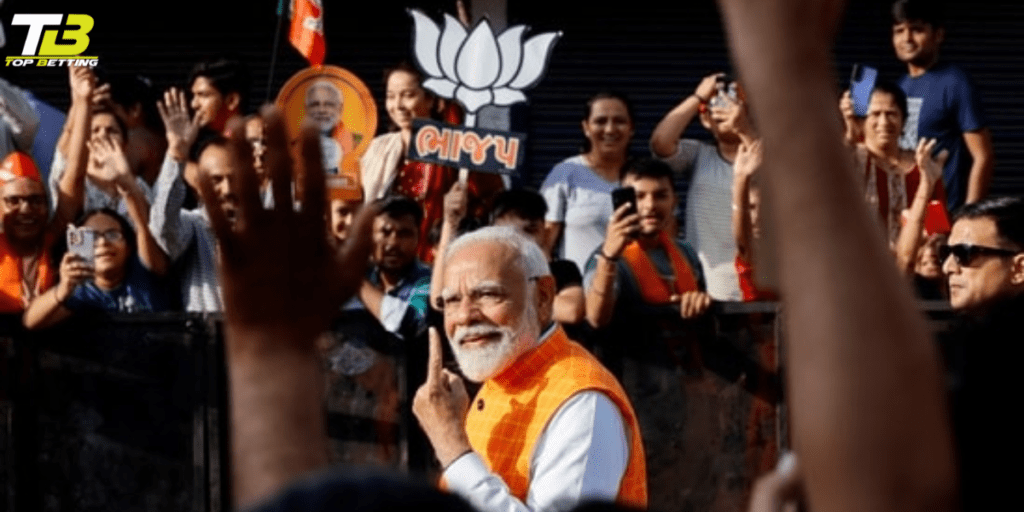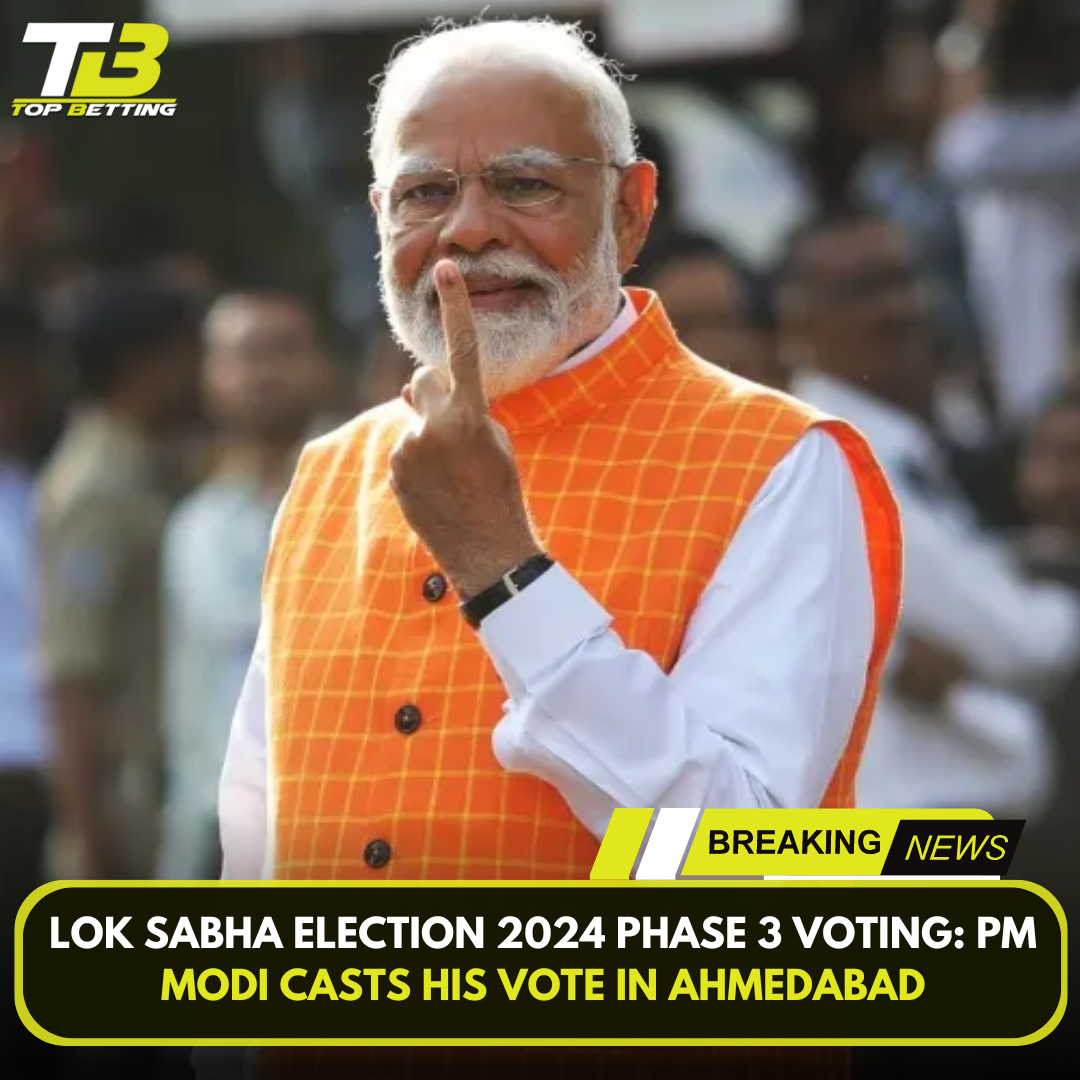
PM Modi casts his vote in Ahmedabad |Lok Sabha Election 2024
As the highly anticipated 2024 Lok Sabha elections continue to captivate the nation, the third phase of polling kicked off on May 7th, 2024, with voters in 93 constituencies across 11 states and union territories heading to the polls. At the forefront of this democratic exercise was Prime Minister Narendra Modi, who set an inspiring example by casting his vote at a polling station in Ahmedabad, his home state of Gujarat.
The significance of this moment cannot be overstated, as the Prime Minister’s participation in the electoral process underscores the importance of civic engagement and serves as a powerful reminder to all citizens of the responsibility they hold in shaping the future of the world’s largest democracy.
Lok Sabha Elections 2024: An Overview of Phase 3
The third phase of the Lok Sabha elections witnessed a diverse array of constituencies going to the polls, including several high-profile seats that held immense strategic importance for the major political parties. From the battleground state of Gujarat, where the ruling BJP was aiming to consolidate its stronghold, to the politically charged constituencies of Maharashtra and Uttar Pradesh, the stage was set for a fiercely contested battle.
Key Constituencies to Watch
Among the constituencies that garnered significant attention were Gandhinagar in Gujarat, where Home Minister Amit Shah was contesting against the Congress’ Sonal Ramanbhai Patel, and Baramati in Maharashtra, where the long-standing political rivalry between the Pawar family members, Supriya Sule and Ajit Pawar, came to a head.
Other closely watched seats included Vidisha and Guna in Madhya Pradesh, where former Chief Minister Shivraj Singh Chouhan and Jyotiraditya Scindia, respectively, were vying for victory against their Congress opponents.
PM Modi Sets the Tone: Casts His Vote in Ahmedabad
As the nation’s attention turned towards the third phase of the elections, all eyes were on Prime Minister Narendra Modi, who made a decisive move by casting his vote at the Nishan Higher Secondary School in Ahmedabad, Gujarat. This act of civic participation not only underscored the Prime Minister’s commitment to the democratic process but also served as a powerful rallying call for all eligible voters to exercise their fundamental right.
Modi’s Appeal for Voter Participation
Addressing the media after casting his vote, PM Modi emphasized the importance of voter turnout, urging the electorate to participate in large numbers. “Today is the third phase of voting. There is great importance of ‘daan’ (contribution) in our country, and in the same spirit, the countrymen should vote as much as possible,” the Prime Minister said, highlighting the significance of every vote in shaping the nation’s future.
Praise for the Election Commission
The Prime Minister also commended the Election Commission of India and the security forces for their efforts in conducting the first two phases of the Lok Sabha polls with minimal incidents of violence. “I congratulate the Election Commission and security forces for conducting the first two phases of the LS polls with hardly any violence,” Modi stated, underscoring the importance of a free and fair electoral process.
Participation Across the Country
As the third phase of the Lok Sabha elections commenced, voters from various states and union territories made their way to the polling booths, determined to have their voices heard. From the northern state of Uttar Pradesh to the southern reaches of Karnataka, citizens from all walks of life demonstrated their commitment to the democratic process.
Highlights from Key States
In Uttar Pradesh, the fate of several high-profile candidates, including Union Minister S.P. Singh Baghel and Uttar Pradesh Tourism Minister Jayveer Singh, was to be decided. The Mainpuri constituency, previously held by the late Mulayam Singh Yadav, also witnessed a closely watched contest, with Dimple Yadav, the Samajwadi Party candidate, vying to maintain the family’s stronghold.
Meanwhile, in Karnataka, the 14 Lok Sabha seats up for grabs saw a fierce battle, with the BJP aiming to build on its previous success in the state. Former Chief Minister B.S. Yediyurappa expressed confidence in the party’s ability to secure a minimum of 25-26 seats, underscoring the high stakes involved.
Controversies and Challenges
As with any major electoral event, the third phase of the Lok Sabha elections was not without its share of controversies and challenges. From candidate changes to concerns over voter turnout, the campaign trail was marked by a range of issues that tested the resilience of the political landscape.
Candidate Changes and Protests
One such controversy unfolded in the Prantij constituency of Gujarat, where the initial BJP candidate, Bhikhaji Thakor, withdrew his nomination, citing “personal reasons.” This move triggered protests from his supporters, who were unhappy with the subsequent nomination of Shobhnaben Baraiya. The episode highlighted the delicate nature of candidate selection and the potential for grassroots backlash.
Addressing Heatwave Concerns
Another challenge faced during the third phase was the extreme heatwave conditions in several regions, particularly in Karnataka. The Election Commission of India proactively implemented comprehensive measures to ensure that the sweltering temperatures did not impede voter turnout, underscoring the importance of safeguarding the democratic process even in the face of adverse environmental conditions.
Analyzing the 2019 Lok Sabha Results
To gain a deeper understanding of the political landscape ahead of the 2024 elections, it is crucial to examine the results of the previous Lok Sabha polls held in 2019. In the constituencies that went to the polls during the third phase, the Bharatiya Janata Party (BJP) had emerged as the dominant force, securing a remarkable 71 out of the 93 seats.
The BJP’s Dominance
The BJP’s impressive performance in 2019 was a testament to its strong organizational capabilities and the appeal of Prime Minister Narendra Modi’s leadership. The party had managed to consolidate its position in states like Gujarat, Karnataka, and Madhya Pradesh, while also making significant inroads in traditional opposition strongholds.
The Congress Party’s Struggle
In contrast, the Congress party, the principal opposition force, had a much more modest showing, winning only 4 of the 93 seats. This stark disparity highlighted the challenges the party faced in regaining its footing and presenting a cohesive alternative to the ruling coalition.
The Road Ahead: Analyzing the 2024 Scenario
As the nation eagerly awaits the outcome of the 2024 Lok Sabha elections, the third phase of voting serves as a crucial barometer for the political fortunes of the major parties. With high-stakes constituencies in play and the Prime Minister leading by example, the stage is set for an intense and closely watched battle.
Factors Shaping the Narrative
Several key factors are poised to shape the narrative during this phase of the elections. The performance of the ruling BJP in its strongholds, the ability of the opposition INDIA alliance to mount a credible challenge, and the impact of local issues and alliances will all play a pivotal role in determining the eventual outcome.
Potential Shifts in the Political Landscape
Moreover, the dynamics within the Pawar family in Maharashtra, the BJP’s efforts to wrest control of the Congress’ South Goa stronghold, and the ongoing debate around reservation and constitutional issues are all likely to influence the voting patterns and the overall political landscape.

Conclusion
As the third phase of the Lok Sabha elections unfolds, it serves as a testament to the strength and resilience of India’s democratic institutions. The active participation of the Prime Minister, the concerted efforts of the Election Commission, and the determination of the electorate to make their voices heard all contribute to the vibrancy of the electoral process.
In the face of challenges and controversies, the successful conduct of this phase will undoubtedly set the tone for the remaining stages of the elections, ultimately shaping the future leadership and direction of the world’s largest democracy. The nation watches with bated breath, eager to witness the unfolding of this crucial chapter in India’s democratic journey.











